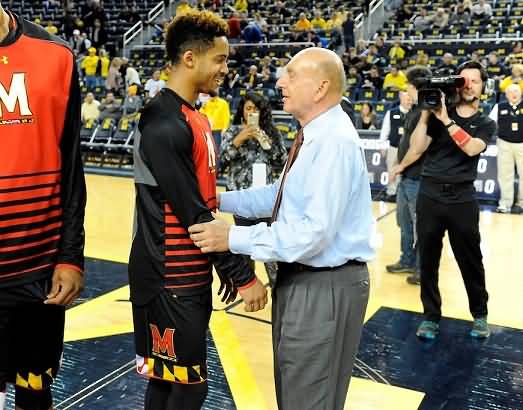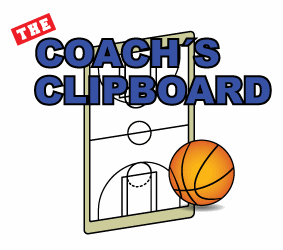Playing With Gratitude
by Anthony B. Lanzillo
From the Coach’s Clipboard Basketball Playbook"Helping coaches coach better..."
Tone Lanzillo is a mental prep coach to athletes who want to be mentally prepared to play their best game. He has worked with student-athletes, from middle school through high school and into college, in such sports as basketball, football, soccer and lacrosse. Over the past several years, he has written for a number of sports blogs and websites, including FirstDown Playbook, Coaches Training Room, Ultimate Hockey Source, and Lax Playbook.
Contact: Anthony B. Lanzillo

Erwin Raphael McManus - Uprising: A Revolution Of The Soul
In my work as a mental skills coach to athletes, I often talk about how they can take six different steps to reach their mental peak and elevate their performances. One of those steps is to play with the right perspective. And when I talk to athletes about playing with the right perspective, I always encourage them to play with gratitude.
Through my experiences in working with athletes, I find the athlete who is grateful is more engaged, is more enthusiastic, and generally plays with a greater sense of enjoyment. By playing with a grateful perspective, an athlete sees everything with a positive, productive and proactive mindset. This is the athlete who truly appreciates the opportunities that sports provide, brings passion to the game and is able to persevere through various challenges and obstacles that may present themselves along the journey.
Over the past several weeks, I've been talking to two basketball players - one in Virginia and the other in Ghana - who have been struggling with different challenges. The basketball player from Virginia started his college career at a Division 1 school but left and had to deal with several injuries and playing with other college teams. Last summer, he returned to the game, played in a Las Vegas tournament and did fairly well. Yet, no one contacted him after the tournament and then a sports agent took his money without helping him find any professional invitations to play.
When this player contacted me, he felt like he had hit rock bottom and wasn't sure if he had a future in basketball. After exchanging emails for a few days, I encouraged him to take the negative experiences and put them into a positive frame of reference. I wanted him to think about how these experiences have made him a stronger person and athlete. In his next email back to me, this player stated that God has a plan for him and he needs to stay focused, and use all of his experiences to help him move forward.
The player in Ghana had contacted me because he had a difficult decision to make and wasn't sure if he was doing the right thing. He was taking some college courses and playing amateur basketball in his home country. The Ghana player stated that he wanted to play in the NBA someday but wasn't sure what to do. He wasn't getting much training, and there weren't many resources to support basketball in Ghana.
Several months ago, he was informed that a doctor from Ghana who was living and working in China had offered him a full scholarship to attend a university in China. Again, after exchanging emails for about a week, I encouraged him to be grateful for the opportunity to get a college education on a full scholarship, and that this university did have a basketball team that could possibly give him a chance to play organized basketball and continue to develop his game. Also, I wanted him to look at everything that he has gone through in a third-world country to get to this point, and how all of his experiences have made him a stronger person and athlete.
"...we must learn to look at things that test us not as obstacles, but as opportunities for growth."
Johann Christoph Arnold - Seeking Peace: Notes And Conversations Along The Way
I have met so many athletes who are not able to play with the right perspective, and always seem to find something to complain about or to blame on someone else. I tell athletes that they have to be careful not to step on any "mental landmines". When they start complaining, blaming, doubting, or questioning themselves or others, these athletes have "blown up" their mental game. Not only do they have difficulty concentrating, being composed and playing with confidence but they have become mentally wounded and disabled. They have raised the white flag and surrendered.
Being grateful for not only the good things that happen to us but also the bad things is not easy to do. For most of us, we just take for granted all the good things. We don't realize the power of being thankful. Also, there are many athletes who easily take credit for their successes, and feel good about themselves, and yet will blame others for their failures and try to distance themselves from what they consider problems with their game. And there are many athletes who negatively judge themselves when they make a mistake or have failed.
In sports today, I see a lot of athletes in high school, college and the pros who are more inclined to have a sense of entitlement. They just expect everything to go their way. These athletes are self-centered, aren't team-oriented, have short emotional fuses and aren't open to learning anything new to improve their game. And, in talking to coaches, these athletes can be difficult to coach and work with.
If you are an athlete, think about how your experiences in sports can be more empowering and enjoyable when you are playing with gratitude. One mental skills tool that I use with athletes, which can help them become more grateful, is to "create a compelling story". Very often, there are athletes who create stories in their heads that focus on their mistakes, failures, lost opportunities and not being able to rise to the challenge. They have stories that develop a negative mindset and trigger feelings of frustration, anger and disappointment.
In creating a compelling story, the athlete focuses on why he plays the game, what he loves about playing sports, his personal strengths and how he uses those strengths to serve his team, coaches and teammates who have been supportive, highlights of successfully overcoming different challenges and obstacles, and how he has grown - mentally, emotionally and spiritually - as an athlete and person. This kind of story will definitely inspire and motivate an athlete to give his best effort.
So, begin identifying and writing down different affirmations that declare your gratitude as an athlete who is playing sports. For example - "I am grateful for being able to play sports." - "I am grateful to my teammates and coaches." - "I am grateful that I have practices so I can become a better player." - "I am grateful for the mistakes I make and turning them into teaching moments so I can become a better player." - "I am grateful for the various challenges and obstacles that I faced and how they have made me mentally stronger and tougher." - "I am grateful for the drills, exercises, running and workouts in the weight room that make me physically stronger." - "I am grateful to my parents and family for their support and encouragement."
"The foremost quality of a trusting disciple is gratefulness. Gratitude arises from the lived perception, evaluation, and acceptance of all of life as grace - as an undeserved and unearned gift from the Father's hand."
Brennan Manning - Ruthless Trust: The Ragmuffin's Path to God
Related page: Basketball Mental Prep Playbook




